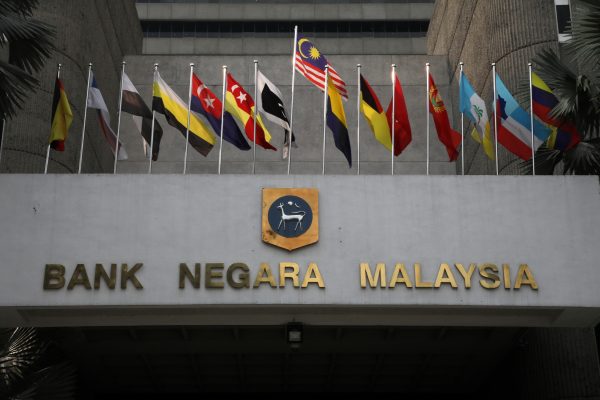The government released its ‘Shared Prosperity Vision 2030’ in October 2019. It aims for a decent standard of living for all Malaysians by 2030 and emphasises the importance of narrowing inequality. The 2020 budget speech in October 2019 highlighted measures in line with the Vision’s aspirations, including more funding for rural development projects and income support for low-income middle-age individuals.
Income inequality in Malaysia has narrowed in the last three decades. But despite the government’s emphasis on inclusive growth, Malaysia’s tax and transfer systems play a limited role in income redistribution. In a set of internationally comparative data, Malaysia’s Gini co-efficient in 2016 was 0.41 after income redistribution measures such as progressive tax and social protection. It was 0.44 without these measures, meaning Malaysia’s redistribution only minimally reduces income inequality.
To enhance societal wellbeing, particular focus should be placed on increasing the living standards of the bottom 40 per cent of households by income across all ethnicities, shifting from long-standing race-based support to needs-based support.
Social protection expenditure is highly fragmented — a multitude of small-scale specific purpose programmes administered by a diverse range of ministries. Coverage is still incomplete. Integrating fragmented programs and streamlining overlapped ones will create a more efficient and less costly delivery of social protection. For example, more targeted and integrated support for education and skills training to low-income households can contribute to upward social mobility and improve the productivity of the economy as a whole.
Going forward, the government needs to finance pension and healthcare costs that are rising due to demographic changes and rising living standards. Increasing tax revenue is needed to strengthen social protection, as the 2019 OECD Economic Survey of Malaysia recommends.
Reforms of policy settings are needed to ensure medium-term fiscal sustainability. This will strike a balance between maintaining macroeconomic resilience and promoting inclusive growth. To ensure mid- and long-term fiscal sustainability, the government plans to strengthen fiscal discipline, spending effectiveness and transparency through the Fiscal Responsibility Act to be implemented in 2020.
Above all, producing a broader and more sound structure of revenue collection is critical. Revenue collection in 2017 made up 16.3 per cent of GDP, and total tax revenue was 13.1 per cent, which was low compared to other Southeast Asian countries such as the Philippines, Thailand and Vietnam. The revenue mix relies strongly on direct taxes, and revenue is volatile due to oil-related receipts. This is further reinforced by the abolishment of the Goods and Services Tax in 2018 which was replaced by the Sales and Services Tax (SST) with a smaller tax base.
To maintain the fiscal balance, the government increased the special dividend from PETRONAS — the state-owned natural resource firm — to be 11.4 per cent of its estimated 2019 fiscal revenue. The government also introduced a series of revenue-increasing measures including streamlining tax incentives to reduce tax leakages, and is introducing new taxes such as a departure levy for all outbound air travellers.
Despite these measures, further reforms are needed to increase tax revenue to make growth work for all in the long run. Notably, Malaysia needs a more balanced tax mix between direct and indirect taxes and it should widen the tax base, taking into account of the trade-off between efficiency and equity.
For this purpose, the OECD report recommends widening the consumption tax base to increase the contribution of the SST. The OECD estimates that increasing the coverage of the SST from 38 per cent to 50 per cent of the private consumption basket could potentially increase tax collection by 0.9 per cent of GDP. Multiple SST tax rates could also be streamlined. Another OECD research paper indicates that simple and broad-based consumption taxes reduce compliance costs and distortions to consumption.
The government is rightly prioritising building up fiscal space and medium-term sustainability, highlighting the risks associated with Malaysia’s large stock of government debt and government guaranteed debt of state-owned enterprises (SOEs).
Strengthening public debt management is essential to ensure fiscal sustainability by reducing the risk of materialising contingent liabilities. Malaysia’s government loan guarantees to SOEs stood at 18 per cent of GDP at the end of June 2019. Additionally, commitments to pay lease payments for Public–Private Partnership projects were 12 per cent. These liabilities totalled 30 per cent of GDP. This is high, considering that the federal government’s debt was 52.6 per cent of GDP at the end of June 2019.
To address this issue, the government established the Debt Management Committee in June 2019. More transparent and solid SOE governance should help reduce this risk.
Since its inauguration, the government has rightly prioritised mid- and long-term fiscal sustainability by strengthening the transparency of the budget process and reducing the risk and uncertainty of public debt and liabilities. This is a sound fiscal framework for the aspiration of ‘shared prosperity’. Additionally, well-articulated planning of fiscal consolidation measures and improvement of social protection in the long run should contribute to a better understanding of a balance between these two important policy issues.
Hidekatsu Asada is Associate Professor at the Graduate School of Humanities and Social Sciences (Economics), Saitama University, Japan, and former Head of the Southeast Asia Desk, OECD Economics Department.

